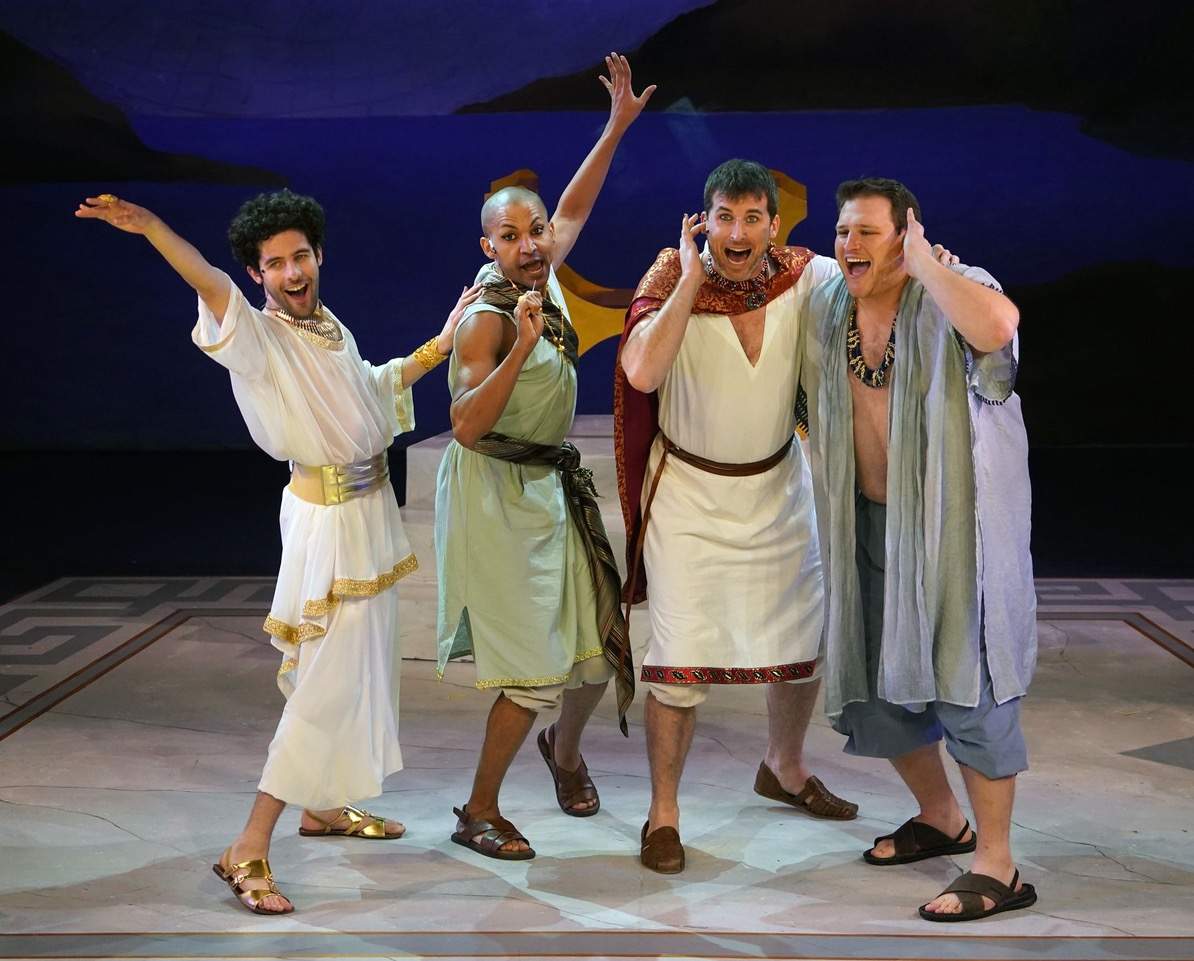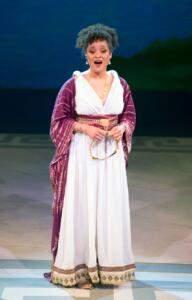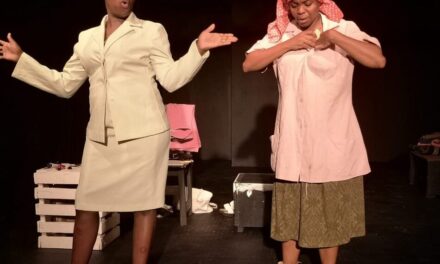The new musical Penelope by the York Theatre Company was a fresh and hilarious comedic take on Homer’s classic epic poem, The Odyssey.
The curtain opened on a Greek choir, assembled in a tight cluster upstage. As they began introducing the semi-tragic tale of Penelope, Queen of Ithaca, famous suitors appeared adorned with gold jewelry and capes. They assumed their positions around the stage and commenced in a routine of pushups and iron pumping in an attempt to impress Penelope. But, she wasn’t buying it. So, they burst into a barbershop acapella, harmonizing about their desire to wed and bed her, punctuating each chorus with the hook, “she’s gonna be mine someday.” Every time they sang this hook, they flashed their muscles and grinned suggestively at the audience. Indeed, these were the bros of Ithaca! Perhaps they hadn’t seduced Penelope, but they surely had charmed the audience.
In this particular production, Penelope was no damsel in distress. Diverting from the original Odyssey, this Penelope was a fierce and cunning weaver of stories. So, rather than surrendering to the unrelenting desires of the suitors, she fabricated glorious and fantastical stories. Her plan? If the stories inspired awe and fear in the suitors, then by fearing the eventual return of the almighty and potentially wrathful Odysseus, the suitors might be somewhat deterred from chasing her. In reality, she hadn’t heard from Odysseus in years and wasn’t even sure if he was still alive. But, she knew that reading these “letters from the king” was the only thing that could keep the suitors at bay. So, yes, according to this production, Penelope was, in fact, the secret author behind the Odyssey! However, if there was one thing that couldn’t be held at bay, it was the fantastic vocal arrangements of the suitors who sang about their Penelope-obsession while Telemachus, Penelope’s son, accompanied them with a pulsating beat on the cajon.
Soon, the suitors began to grow suspicious of the real authorship of the letters, and Penelope was left wondering how much time she had left before the truth emerged, and she’d be forced to remarry. She expressed her exhaustion and yearning in an “I want” song. As the stage darkened, a spotlight shone, and a luscious cello played. The intimate scene was set for the revelation of Penelope’s deepest desire: to have the simple man she’d married rather than the hero character that she’d invented in her stories. The bottom line: Penelope realized that she wants a nice guy not a bad boy.
But, the obsessed suitors were stuck in their own frat boy world! They strolled back on stage singing a cabaret-ish tune about the “suitor that will suit her” while quietly admitting that they’d happily settle for singing at the wedding even if they wouldn’t get chosen to be Penelope’s husband. One especially diva suitor whipped out a prop from ancient Greece, a nail file, ready to pamper himself for the Queen. Afterwards, we saw the parallel story line of Telemachus, the son who yearns to protect his mother and be respected as a strong male figure, like his father. In a song evoking Travolta singing “Summer Nights,” Telemachus engaged in self-affirmations, singing, “Enough acting like a mouse, it’s time to be the man of the house.”

Jason Alexander Simon, David LaMarr, Sean Thompson, George Slotin. Photo Credit: Carol Rosegg.
As the Second Act began, the mischievous suitors appeared onstage in swim shorts, singing a Beach Boys-esque song. While swinging with the music, they declared with absolute confidence that their betrothal to Penelope was imminent. Unfortunately for them, Odysseus washed ashore in rags during the following scene, met by Telemachus who mistook him for the blind poet, Homer. The now disguised Odysseus sang him a sweet song with his lyre, and as the song suddenly shifted into a pop-rock feel, he turned the lyre to the side, intensely strumming it like a guitar. The disguised Odysseus went on to meet Penelope, who, upon meeting him, commented that there was “something in his touch…it makes me feel bold, which is weird cause he kinda old.”
Once Odysseus’s true identity was privately revealed to both Telemachus and Penelope, the famous contest to win Penelope’s heart began. As Penelope explained, the suitor that would successfully string Odysseus’s bow and shoot an arrow through twelve axes would be her husband. Just like in the original Odyssey, the suitors mocked the “weak and blind” poet for even attempting to string the bow of the great Odysseus. When “the blind poet” cast off his rags and revealed who he truly was, the musical yet again diverged from the original storyline. Rather than slaughtering every suitor in sight – which would have been too R rated for a musical comedy – Odysseus agreed to spare their life on one condition: that they never sing together again. “Ok then, kill us” replied the emotionally broken suitors. In their musical world, not singing was considered a more terrible punishment than death! This Off-Broadway version of Odysseus was merciful and added a new clause, “You must not sing together again…in Ithaca.” And, so, the overjoyed suitors declared that they will go on tour abroad!

Britany Nicole Simpson as Penelope. Photo Credit: Carol Rosegg.
In the final moments of the musical, Penelope and the now kingly looking Odysseus reunited in a loving embrace. She told him about how she invented stories to keep the suitors off her back. She showed him the manuscripts of her tall tales, and he complimented their high quality. Rather than encouraging her to publish them, the forever chauvinist, Odysseus, advised her to send them to Homer who would publish them in his name. On top of that, Odysseus revealed that the gods punished him by forcing him to make love with the goddess Calypso every day. At the same time, loyal Penelope spent years protecting their marriage by fighting off suitors. The deeply hurt Penelope was dumbfounded by this double standard, and in a justified rage she yelled, “Get out!”
Alone in center stage, she contemplated her situation to the minor melody of a lone clarinet. Wistfully, she sang of how “the hero has turned into a man.” Herein lies the central motif of the musical: upon closer examination of our greatest heros, we discover that they are merely flawed mortal men, and perhaps it is their female counterparts, who truly persevered in difficult situations, that are more deserving of recognition.
This post was written by the author in their personal capacity.The opinions expressed in this article are the author’s own and do not reflect the view of The Theatre Times, their staff or collaborators.
This post was written by Dvir Avnon-Klein.
The views expressed here belong to the author and do not necessarily reflect our views and opinions.


















